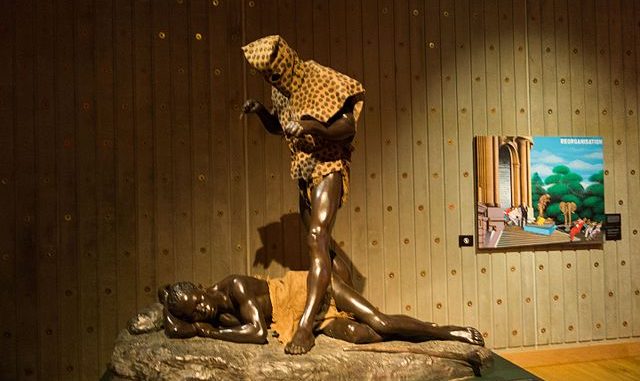
(Source: www.travelnoire.com) – The Anyoto, also known as the leopard men society, were a secret society from eastern Congo. They are one of the most notable social organizations in Africa’s recent history.
They were famous for killing their enemies with fake leopard claws and leaving fake footprints near corpses left in the forest, giving the impression of death by leopards. Anyoto means ‘to scratch’ in Kibali, a Bantu language spoken in Congo.
It is also believed that they existed in the 1700s in ancient Ivory Coast, Gabon, Nigeria, Liberia and Sierra Leone
Once described by Western colonialists as barbarians, savages and other misrepresentations given to African people, the Anyoto’s image is starting due to recent approaches made by African scholars giving a fair depiction of this controversial secret association.
Some sources state that the leopard men society used to practice cannibalism. However, most of those sources are from the colonial era.
“Through the images of the leopard-men, the Congo and Africa were represented as uncivilized places, characterized by cannibalism and brutal murders. These stereotypes have stood in the way of understanding the real purposes of this society. In recent years, particularly in Belgium, the continued use of leopard-men in images of Africa has caused polemical reactions among academics and Congolese concerned with representation of Africa,” writes Vicky van Bockhaven in a scholar article entitled Leopard-men of the Congo in Literature and Popular Imagination.
According to the professor, images of the leopard men society contribute to stereotypical and racist representations of past African societies being overemphasized, similarly as contemporary war and violence. Such stereotypes suggest that there is a historical and cultural predestination for war and violence in Africa.

However, as the terror against the Belgians continued, the secret association was unveiled. The Anyotos were persecuted, convicted and totally dismantled in the 1930s.
“Such cultural predispositions have stood in the way of understanding the real purposes of this society. Anyoto men’s activities were a way of maintaining local power relations, performing indigenous justice in secret and circumventing colonial government control,” writes Bockhaven.
After its demise, Anyoto society’s image gained ground in popular culture.
It was mentioned in the infamous Tintin in the Congo, and in the short story Tarzan and the Leopard Men by Edgar Rice Burroughs (1935). Both depicted Anyoto society members as evil adversaries of the protagonist. In the novel Tarzan and the Leopard Men, Tarzan is confronted by the leopard men, and described as people who practice evil acts and cannibalism.

“In the fictional writings, all of these anti-social aspects are ascribed to the Anyoto and their accomplices. They behave like animals, are promiscuous and unpredictable, eat human flesh, smell badly, get drunk to the point of passing out and so on. In reality, the Anyoto men were a threat to the societal colonial order, and they could not be controlled,” says Bockhaven.
Recently, Anyoto influence was seen in the Black Panther movie, which shows African men wear leopard costumes to defend the interests of their society.
Currently, the Anyoto costumes are in the collection of the Royal Museum for Central Africa, in Belgium.

Be the first to comment